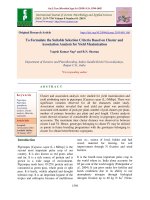Generation mean analysis for yield, yield components and MYMV disease scores in blackgram [Vigna mungo (L).Hepper]
Bạn đang xem bản rút gọn của tài liệu. Xem và tải ngay bản đầy đủ của tài liệu tại đây (209.4 KB, 7 trang )
Int.J.Curr.Microbiol.App.Sci (2019) 8(5): 1989-1995
International Journal of Current Microbiology and Applied Sciences
ISSN: 2319-7706 Volume 8 Number 05 (2019)
Journal homepage:
Original Research Article
/>
Generation Mean Analysis for Yield, Yield Components and MYMV
Disease Scores in Blackgram [Vigna mungo (L).Hepper]
K. Vadivel1, N. Manivannan1*, A. Mahalingam1, V.K. Satya2,
C. Vanniarajan3 and V.R. Saminathan1
1
National Pulses Research Center, Tamil Nadu Agricultural University,
Vamban Colony-622303, TamilNadu, India
2
Krishi Vigyan Kendra, Tamil Nadu Agricultural University, Tindvanam, TamilNadu, India
3
Department of Plant Breeding and Genetics, Agricultural College and Research Institute,
Tamil Nadu Agricultural University, Madurai, TamilNadu, India
*Corresponding author
ABSTRACT
Keywords
Blackgram, Gene
action, Generation
mean analysis,
MYMV disease,
Seed yield
Article Info
Accepted:
17 April 2019
Available Online:
10 May 2019
Generation mean analysis was employed in two crosses viz., MDU 1 x Mash 114 and
MDU 1 x Mash 1008 of balckgram to partition the mean into various components viz.,
additive, dominance and epistasis. Traits viz., number of clusters per plant, pod length, and
number of seeds per pod were controlled by additive gene action in the cross MDU 1 x
Mash 114. The additive as well as additive x additive type of gene action were in control
of seed yield per plant, MYMV disease scores and most of yield components in the cross
MDU 1 x Mash 114. Hence selection at later generation is effective to improve these traits.
In case of MDU 1 x Mash 1008 also, most of the traits except seed yield per plant, number
branches per plant and number of cluster per plant had epistatsic model. Hence selection
needs to be postponed to later generation. Hence based on gene action, the cross MDU 1 x
Mash 114 may be utilized to evolve high yielding plants with MYMV disease resistant
genotypes.
Introduction
Blackgram (Vigna mungo (L.) Hepper) is an
important food legume crop of Indian subcontinent. It is an important short duration
crop and widely cultivated in India. It gives us
an excellent source of easily digestible good
quality protein and ability to restore the
fertility of soil through symbiotic nitrogen
fixation. Seeds are highly nutritious with
protein (24-26%), carbohydrates (60%), fat
(1.5%), minerals, amino acids and vitamins.
The biological value improves greatly, when
wheat or rice is combined with blackgram
because of the complementary relationship of
the essential amino acids such as arginine,
leucine, lysine, isoleucine, valine and
phenylalanine, etc. (Mehra et al., 2016). In
India, the area comes under blackgram is
about 4.50 million hectares with the
1989
Int.J.Curr.Microbiol.App.Sci (2019) 8(5): 1989-1995
production
of
3.23
million
tonnes
(Annonymous, 2018). Mungbean Yellow
Mosaic Virus (MYMV) is a significant biotic
stress causing profound yield loss in
blackgram. MYMV belongs to the genus
Begomovirus and transmitted by the vector
whitefly, Bemisia tabaci. Yield loss due to
this disease varies from 5 to 100 per cent
depending
upon
disease
severity,
susceptibility of cultivars and population of
whitefly (Nene, 1972). The low yield levels
are due to several biotic and abiotic factors.
The estimates of genetic components of
variation would be very useful to adopt
suitable breeding method and to find the
appropriate generation for the improvement of
traits (Khattak et al., 2001). With these
backgrounds, the present investigation was
carried out to find out the gene action for seed
yield, yield components and MYMV disease
score through generation mean analysis.
Materials and Methods
The experiment was conducted at National
Pulses Research Centre, Vamban during
kharif 2018 in two crosses of blackgram viz.,
MDU 1 x Mash 114 and MDU 1 x Mash 100.
MDU 1 is a high-yielding popular blackgram
variety grown in Tamil Nadu, but highly
susceptible to Mungbean Yellow Mosaic
Virus (MYMV) disease. The variety was
released during 2014 by Agriculture collage
and Research Institute, Tamil Nadu
Agricultural
University,
Madurai
for
commercial cultivation. Mash 114 and Mash
1008 are varieties released by Punjab
Agricultural University, Ludhiana and
resistant to MYMV disease. Five generations
viz., P1, P2, F1, F2 and F3 of these two crosses
were evaluated during kharif 2018.
Populations were screened for MYMV
disease resistance through infector row
method. Susceptible variety CO 5 and MDU 1
were used in the infector row. Recommended
agronomic packages of practices were
followed to raise the crop. Observations were
recorded on individuals plant in respect of
plant height (cm), number of branches per
plant, number of clusters per plant, number of
pods per cluster, number of pods per plant,
pod length (cm), number of seeds per pod,
100-seed weight (g), MYMV disease score at
45 DAS, MYMV disease score at 60 DAS
and seed yield per plant (g). Mean of five
generations viz., P1, P2, F1, F2 and F3 were
used to estimate genetic parameters. The
MYMV disease score was recorded on 45 and
60 DAS, by using phenotype rating scale
from 1 (resistant) to 9 (highly susceptible)
(Table 1), as suggested by Singh et al.,
(1995). Scaling test was conducted as
suggested by Mather (1949). The adequacy of
simple additive-dominance model was
detected by employing C and D scaling test
suggested by Mather and Jinks (1971). The
additive-dominance model was considered
inadequate when any one of the two scales
was found to deviate significantly from zero.
Genetic parameters were estimated following
Hayman (1958).
Results and Discussion
A good knowledge on the genetic systems
controlling expression of the characters
facilitates the choice of the most efficient
breeding
and
selection
procedure
(Gopikannan and Ganesh, 2013; Mangaldeep
et al., 2015). The generation mean analysis
was adopted to detect non-allelic interaction
component of the mean of the phenotypic
distribution. The results of scaling test and
genetic parameters in each cross were
presented in (Table 2 and 3).
Plant height (cm)
The estimate of scaling test revealed that both
crosses MDU1 x Mash 114 and MDU1 x
Mash 1008 showed significance for the scale
D. Additive (d), dominance (h) and additive x
1990
Int.J.Curr.Microbiol.App.Sci (2019) 8(5): 1989-1995
additive (i) effects were significant in the
cross MDU1 x Mash 114. Additive (d),
dominance (h) and dominance x dominance
(l) components were significant in the cross
MDU1 x Mash 1008. The results indicated
that additive, dominance and epistatic
component of additive x additive gene action
are involved in controlling this trait in MDU1
x Mash 114. However in case of MDU1 x
Mash 1008, in addition to additive,
dominance components, epistatic component
of dominance x dominance was also
important. Similarly Kanchana Rani (2008)
and Thamodharan et al., (2015) recorded
additive and non-additive gene action
respectively.
Number of branches per plant
The scaling test revealed that scale C was
significant in both crosses MDU1 x Mash 114
and MDU1 x Mash 1008. In cross MDU1 x
Mash 114, components additive (d) and
additive x additive (i) components were
significant. It indicated the presence of
additive, additive x additive gene action in
this cross. In case of MDU1 x Mash 1008,
components on dominance x dominance (l)
was significant. It indicated the presence of
dominance x dominance type of gene actions
in the cross. Same results of additive and nonadditive gene action were given by Latha et
al., (2018) and Prasad and Murugan (2015)
respectively.
Number of clusters per plant
The scaling test showed the significance of
the scale D in the cross MDU1 x Mash 1008
for number of cluster per plant, which implied
the inadequacy of the simple additivedominance model for this cross. In case of
MDU1 x Mash 114, scaling test indicated that
roll of simple additive dominance action. In
case of MDU1 x Mash 114, additive (d)
component alone was significant. In case of
MDU1 x Mash 1008, additive x additive (i)
and dominance x dominance (l) components
were significant. The results indicated that
epistatic gene action plays a major role in
MDU1 x Mash 1008 and additive gene action
in MDU 1 x Mash 114. Similarly additive
gene action was reported by Kanchana rani
(2008) and Latha et al., (2018). Non-additive
gene action was reported by Thamodharan et
al., (2015). `
Number of pods per cluster
In case of number of pods per clusters showed
significant for D scale in the cross MDU1 x
Mash 114 and significance of the scales C and
D in MDU1 x Mash 1008. If indicated the
epistatic model in both crosses. In case of
MDU1 x Mash 114 additive x additive (i) and
dominance x dominance (l) components were
significant. The results indicated that epistatic
gene action plays a major role in MDU1 x
Mash 114. However in the cross MDU1 x
Mash 1008, additive (d), dominance (h),
additive x additive (i) and dominance ×
dominance (l) components were significant.
The results indicated that additive and
epistatic gene action plays a major role in the
cross MDU1 x Mash 1008. Non-additive gene
action was reported by Thamodharan et al.,
(2015).
Number of pods per plant
The scaling test revealed that scale D was
significant in the cross MDU1 x Mash 114
and MDU1 x Mash 1008 were significant. In
both crosses viz., MDU1 x Mash 114 and
MDU1 x Mash 1008, components of additive
(d), additive x additive (i) and dominance x
dominance (l) were significant. It indicated
the presence of additive and epistatic type of
gene actions in both crosses. Similarly
Kanchana Rani (2008) and Panigrahi et al.,
(2015) recorded additive and non-additive
gene action respectively.
1991
Int.J.Curr.Microbiol.App.Sci (2019) 8(5): 1989-1995
Pod length (cm)
The scaling test showed the significance of
the scale C in the cross MDU1 x Mash 1008
for pod length, which in turn suggested the
importance of epistatic gene action in the
inheritance of this trait. In case of MDU1 x
Mash 114, simple additive dominance action
plays a major role. In case of MDU1 x Mash
114, additive (d) component alone was
significant and indicated additive gene action.
However in the cross MDU1 x Mash 1008
additive (d), additive x additive (i) and
dominance x dominance (l) components were
significant. It indicated the presence of
additive, as well as epistatic type of gene
actions in this cross. Similarly Kanchana rani
(2008) and Latha et al., (2018) recorded
additive and non-additive gene action
respectively.
Number of seeds per pod
Simple additive-dominance model were
adequate in this cross MDU1 x Mash 114
alone. However, the cross MDU1 x Mash
1008 recorded significance for both scales C
and D, revealing the inadequacy of simple
additive-dominance
model.
Dominance
component in cross MDU1 x Mash 114 was
positive and significant and indicated that
dominance gene action was prominent. In
case of MDU1 x Mash 1008, additive (d),
dominance (h), additive x additive (i) and
dominance × dominance (l) components were
significant. The results indicated that additive
as well as epistatic gene action plays major
role in this cross. Similarly additive and nonadditive gene action was observed by Zubair
et al., (2007) and Latha et al., (2018)
respectively.
100-seed weight (g)
Significance of the scales C and D implied in
sufficiency of simple additive-dominance
model for both crosses. Dominance gene
effect in cross MDU1 x Mash 114 was
significant. The results indicated that
dominance gene action and other non genetic
effects were prominent in MDU1 x Mash 114.
In cross MDU1 x Mash 1008, components
additive (d) and additive x additive (i)
components were significant. It indicated the
presence of additive and epistatic gene action
plays major role in this cross. Similarly
additive gene action was reported by Zubair et
al., (2007). Non-additive gene action was
reported by Panigrahi et al., (2015). `
Table.1 MYMV disease scoring
Grade
1
2
3
4
5
6
7
8
9
Description
No visible symptoms on leaves
Small yellow specks with restricted spread covering 0.1-5% leaf
area
Mottling of leaves covering 6-10% leaf area
Yellow mottling covering 11-15% leaf area
Yellow mottling and discolouration of 15-20% leaf area
Yellow coloration of 21-30% leaves and yellow pods
Pronounced yellow mottling and discoloration of leaves and pods,
reduction in leaf size and stunting of plants covering 30-50% 0f
foliage
Severe yellow discoloration of leaves covering 50-75% of foliage,
stunting of plants and reduction in pod size
Severe yellowing of leaves covering above of foliage, stunting of
plants and no pod formation
1992
Reaction
Free
Highly Resistant (HR)
Resistant ( R)
Moderately resistant (MR)
Moderately susceptible MS)
Susceptible (S)
Susceptible (S)
Highly susceptible (HS)
Highly susceptible (HS)
Int.J.Curr.Microbiol.App.Sci (2019) 8(5): 1989-1995
Table.2 Scaling test and estimates of genetic parameters for various characters in blackgram the cross MDU1 x Mash 114
Character
Scales
C
D
1.04±5.61
14.70*±6.36
Plant height (cm)
1.28*±0.50
-0.08±0.66
Number of branches per plant
-0.78±2.84
6.15±3.76
Number of clusters per plant
-0.75±0.52
1.85**±0.57
Number of pods per cluster
-1.31±10.01
38.12**±14.29
Number of pods per plant
0.03±0.28
-0.17±0.44
Pod length (cm)
-0.81±0.48
-0.13±0.62
Number of seed per pod
0.76**±0.18
0.48*±0.21
100-seed weight (g)
-4.20**±0.44
1.94±1.53
MYMV disease score at 45 DAS
-1.00±0.62
3.54*±1.73
MYMV disease score at 60 DAS
5.02*±2.41
14.60**±3.75
Seed yield per plant (g)
*,** Significant at 5 and 1 level of probability, respectively.
m
28.43**±1.08
1.92**±0.09
10.03**±0.62
2.70**±0.09
26.71**±2.16
5.27**±0.06
6.85**±0.07
4.20**±0.03
1.29**±0.11
2.38**±0.15
6.36**±0.53
d
10.18**±0.60
0.42**±0.07
1.40**±0.18
0.06±0.06
3.29**±0.50
0.26**±0.04
0.06±0.09
-0.01±0.01
2.69**±0.05
3.26**±0.05
1.14**±0.14
Parameters
h
-13.11**±4.60
-0.35±0.46
-2.69±2.70
-0.56±0.41
-19.71±10.17
0.18±0.30
0.85*±0.42
-0.76**±0.15
-4.68**±1.03
-5.79**±1.18
-8.89**±2.64
i
10.73*±4.23
1.11**±0.41
-1.24**±0.37
-19.06*±8.56
-0.21±0.13
3.38**±0.77
3.99**±0.89
-6.61**±2.19
l
18.21±12.50
-1.81±1.18
3.47**±1.10
52.58*±25.88
0.38±0.41
8.18**±2.19
6.05*±2.58
12.77±6.56
Table.3 Scaling test and estimates of genetic parameters for various characters in blackgram the cross MDU1 x Mash 1008
Character
Scales
C
D
4.05±5.08
25.75**±4.53
Plant height (cm)
-2.16**±0.54
0.52±0.50
Number of branches per plant
-15.41**±2.52
2.59±2.43
Number of clusters per plant
0.75**±0.26
1.98**±0.33
Number of pods per cluster
-41.03**±8.09
23.84**±7.84
Number of pods per plant
2.46**±0.28
0.00±0.21
Pod length (cm)
1.37**±0.44
-0.81**±0.30
Number of seed per pod
0.75**±0.21
0.30*±0.13
100-seed weight (g)
2.58**±0.50
-2.33**±0.66
MYMV disease score at 45 DAS
4.84**±0.48
0.33±0.81
MYMV disease score at 60 DAS
-7.01**±1.66
4.39*±1.78
Seed yield per plant (g)
*,** Significant at 5 and 1 level of probability, respectively.
m
35.30**±0.84
1.96**±0.10
9.99**±0.38
3.01**±0.06
31.40**±1.53
5.40**±0.05
7.00**±0.07
4.28**±0.03
2.99**±0.12
3.84**±0.12
7.00**±0.38
1993
d
5.76**±0.61
0.01±0.07
-0.18±0.24
-0.11*±0.05
-3.57**±0.67
0.55**±0.02
0.35**±0.04
0.17**±0.01
2.69**±0.05
3.26**±0.05
0.07±0.15
Parameters
h
-16.58**±3.39
-0.37±0.37
1.34±1.81
-0.84**±0.22
-1.29±5.89
0.11±0.17
0.78**±0.24
-0.11±0.11
-0.70±0.47
-2.67**±0.56
1.08±1.32
i
-4.97±3.37
-0.69±0.36
-4.65**±1.64
-1.41**±0.22
-29.87**±5.48
1.52**±0.17
1.47**±0.24
0.26*±0.11
7.36**±0.43
7.11**±0.47
-3.94**±1.25
l
28.94**±9.86
3.57**±1.07
24.00**±5.03
1.63**±0.61
86.49**±16.91
-3.28**±0.54
-2.90**±0.78
-0.61±0.36
-6.55**±1.26
-6.02**±1.39
15.20**±3.80
Int.J.Curr.Microbiol.App.Sci (2019) 8(5): 1989-1995
MYMV disease score at 45 DAS
The scaling test showed the significance for
the scale C in the cross MDU1 x Mash 114
and both scales in the cross MDU1 x Mash
1008 recorded significance. The additive,
dominance, additive x additive and
dominance × dominance components were
significant in the cross MDU1 x Mash 114. In
case of MDU1 x Mash 1008, components
additive (d), additive x additive (i) and
dominance x dominance (l) components were
significant. The results indicated that
additive-dominance and epistatic gene action
plays a major role in both crosses.
MYMV disease score at 60 DAS
The scaling test showed the significance for
the scale D and C in the cross MDU1 x Mash
114 and MDU1 x Mash 1008 respectively.
The additive (d), dominance (h), additive x
additive (i) and dominance × dominance (l)
components were significant in both crosses.
The results indicated that additive-dominance
and epistatic gene action plays a major role in
both crosses.
Seed yield per plant (g)
Significance of the scales C and D implied
epistatic model for both crosses. The additive
(d), dominance (h) and additive x additive (i)
effects were significant in the cross MDU1 x
Mash 114.
The results indicated that additive and
epistatic gene action were involved in
controlling this trait in MDU1 x Mash 114. In
case of MDU1 x Mash 1008 additive x
additive (i) and dominance x dominance (l)
components were significant. The results
indicated that epistatic gene action plays a
major role in MDU1 x Mash 1008. Nonadditive gene action was reported by Latha et
al., (2018). `
To conclude, the cross MDU 1 x Mash 114
recorded simple additive-dominance model
for traits viz., number of cluster per plant, pod
length and number of seeds per pod. Hence
selection at early generation itself will be
effective to improve the mean performance of
progenies for these traits. Traits viz., plant
height, number of branches per plant, number
of pods per cluster, MYMV disease score at
45 DAS and 60 DAS and seed yield per plant
had both additive as well as additive x
additive gene action. These traits can be
improved by selection in later generation.
Traits viz., number of pods per cluster and
100-seed weight had epistatic or dominance
gene action. Hence improvement on these
traits may not be effective after the selection.
In case of MDU 1 x Mash 1008 all traits had
epistatic model. Traits viz., plant height,
number of pods per cluster, number of pods
per plant, pod length, number of seeds per
pod, 100-seed weight, MYMV disease score
at 45 DAS and 60 DAS had additive as well
as additive x additive gene action. Hence
selection should be postponed to later
generation to improve these traits. Traits viz.,
number of branches per plant, number of
clusters per plant and seed yield per plant had
any epistatic gene action. Hence improvement
on these traits may not be effective after
selection. Hence the cross MDU 1 x Mash
114 may be used to evolve high yielding
MYMV disease resistant genotypes.
References
Annonymous, 2018. Project Coordinator’s
Reports (Mungbean and Urdbean),
2017-18. All India Coordinated
Research Project on MULLaRP, ICARIndian Institute of Pulses Research,
Kanpur-208204, Uttar Pradesh, India,
Pp-46.
Gopikannan, M., Ganesh, S. K. 2013. Genetic
analysis of sodicity tolerance in rice
(Oryza sativa L.). International Journal
of Agriculture Environment and
1994
Int.J.Curr.Microbiol.App.Sci (2019) 8(5): 1989-1995
Biotechnology 6(4): 527-531.
Hayman, B. I. 1958. The separation of
epistatic from additive and dominance
variation in generation means. Heredity,
12, 371-390.
Kanchana Rani, R. 2008. Genetic studies for
improvement of yield and mungbean
yellow mosaic virus disease resistance
in blackgram. Ph.D. Thesis, Tamil Nadu
Agric. Univ., Coimbatore.
Khattak, G.S.S., Haq, M. A., Ashraf, M. and
Mc Neilly, T. 2001. Genetic basis of
variation in yield and yield components
mungbean
[Vigna
radiata
(L.)
Wilczek]. Heriditas., 13 (4): 211-217.
Latha Swarna, V., Eswari, K.B. and Sudheer
Kumar, S. 2018. Combining ability
analysis for seed yield and its
component characters in greengram
(Vigna
radiata
(L.)
Wilczek.).
International J. Chemical Studies L:
6(2): 237-242.
Mangaldeep, S., Dinesh, K.S., Mani, L.,
Abhijit, K.D., Sankalpa, O. 2015.
Exploitation of heterosis and combining
ability for earliness and vegetative traits
in ridge gourd (Luffa acutangula L.).
International Journal of Agriculture,
Environment and Biotechnology 8(1):
153-161.
Mather, K. 1949. Biometrical genetics.
Methuen and Co. Ltd., London.
Mather, K. and Jinks, J.L. 1971. Biometrical
Genetics: The study of continuous
variation. Chapman and Hall Ltd.,
London.
Mehra, R., Tikle, A.N., Saxena, A., Munjal,
A., Khandia, R. and Singh, M.,
2016.Correlation, path-coefficient and
genetic diversity In Blackgram (Vigina
mungo (L) Hepper). Internat. Res. J.
Plant Sci.,7 (1):001-011.
Nene Y.L. 1972. A survey of the viral
diseases of pulse crops in Uttar Pradesh,
G.B. Pant University of Agriculture and
Technology, Pantnagar, Res. Bull., 4:
191.
Panigrahi, K. K., Mohanty, A., Pradhan, J.,
Baisakh, B., Kar, M. 2015. Analysis of
Combining
ability
and
genetic
parameters for yield and other
quantitative traits in black gram [Vigna
mungo (L.) Hepper]. Legume Genomics
and Genetics. (6, 1): 1-11.
Prasad, A.V.S. and Murugan E. 2015.
Combining ability analysis for yield and
its attributes in Blackgram (Vigna
mungo (L.) Hepper). Electronic J. of
Plant Bred, 6(2): 417-423.
Singh, S.K., Gupta, B.R. and Chib, H.S. 1995.
Relation of plant age with yellow
mosaic virus infection in urdbean. In:
Gupta VK, Sharma RC (eds) Integrated
disease management and plant health.
Scientific Publishers, Joypur, pp 91–92
Thamodharan, G., Ramalingam, A. and
Geetha, S. 2015. Estimation of genetic
parameters and combining ability
analysis in blackgram [Vigna mungo
(L.) Hepper]. Legume Research, 40(3):
401-408.
Zubair, M., Ajmal, S.U., Munir, M. and
Anwar, M. 2007. Mode of inheritance
and variability of some of the traits in
mungbean
[Vigna
radiata
(L.)
Wilczek]. Pak. J. Bot. 39(4): 12371244.
How to cite this article:
Vadivel, K., N. Manivannan, A. Mahalingam, V.K. Satya, C. Vanniarajan and Saminathan,
V.R. 2019. Generation Mean Analysis for Yield, Yield Components and MYMV Disease
Scores in Blackgram [Vigna mungo (L).Hepper]. Int.J.Curr.Microbiol.App.Sci. 8(05): 19891995. doi: />1995

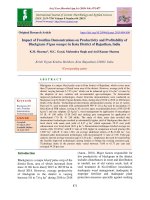
![Generation mean analysis for yield, yield components and MYMV disease scores in blackgram [Vigna mungo (L).Hepper]](https://media.store123doc.com/images/document/2020_01/09/medium_kiu1578565010.jpg)
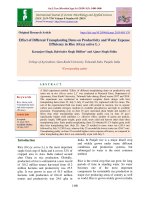
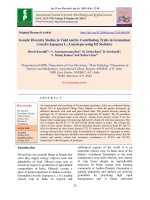
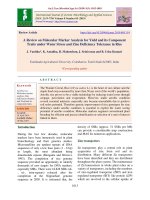

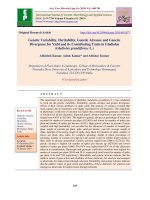
![Genetic variability studies in F2 segregating populations for yield and its component traits in Okra [Abelmoschu sesculentus (L.)Moench]](https://media.store123doc.com/images/document/2020_01/13/medium_nxs1578931693.jpg)
